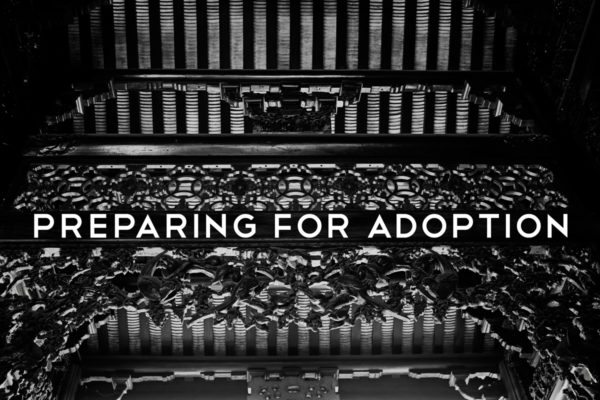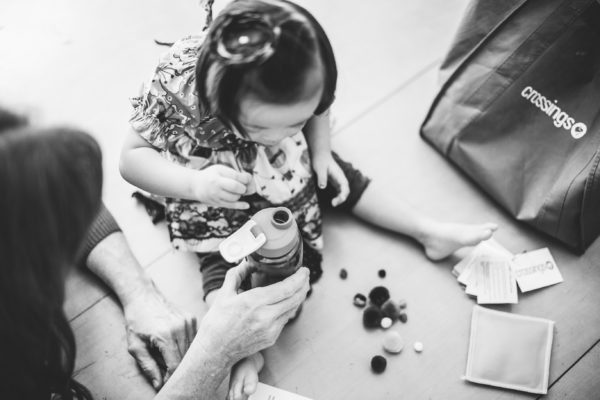You’ve dreamt for this day for months, years even. Planned for it, traveled halfway around the world for it and played it out in your mind a million times. And yet, the reality of becoming a family through adoption is undoubtedly different.
What happens next depends much on how you, as the adoptive parent, process the discrepancy between expectation and reality.
Do you take that initial rejection personally?
Do you panic at un-met milestones?
Does your commitment feel suffocating when the reality of orphanage life is staring you in the face?
Preparing for Adoption is our focus for the next two months. It is our hope to help you be as ready as possible for that day – the day you’ve waiting and longed for – and all the days to follow.

We recently had a chance to speak with Karla Thrasher, China Program Director at Lifeline Children’s Services, and ask her some specific questions about adoption preparedness.
Q: What pre-adoption training does your agency require for adoptive families?
LL: Lifeline believes that the better prepared and equipped adoptive families are, the more successful their post-adoption experiences will be. One component of pre-adoption training is required education and assessing tools. Families adopting through Lifeline can expect to do the following:
NCFA Hague Training – this training gives families adopting internationally a more general overview of the adoption process, focusing on current trends in the bigger picture of international adoption.
The Connected Child – this book provides an oversight into the unique challenges of connecting and forming attachment with a child adopted internationally;
Dept of State Reading- this required website will provide adoptive families with the specifics/logistics of adopting a child from China.
Marriage Prepare/Enrich – Couples adopting through Lifeline will take this survey to identify areas of strength in their marriage and also to highlight any areas of weakness that may inhibit their success post-adoption.
Crossings – Crossings is a training developed by Lifeline specifically targeted (through lecture, discussion times, and hands on activities) to address attachment issues with a child that has experienced trauma.
Lifeline also provides individualized trainings for families adopting older children, sibling groups, children with specific medical needs, etc during the pre-adoption process. As a part of individualized training, parents may also be matched with a mentor family that has walked a road similar to the one they are walking.

Q: How do you see pre-adoption training impacting families post-adoption?
LL: We find that generally, the more prepared adoptive families are overall, the more successful they will be post-adoption. However, this doesn’t mean their post-adoption transition will be “easy” or without issues; it just means they may feel more equipped because of the training they have received to face the challenges we anticipate all adoptive families will experience.
Q: Do you see a correlation between pre-adoption parental preparedness and post-adoption parental satisfaction?
LL: Pre-adoption preparedness does play a significant role in post-adoption parental satisfaction. Some other components that also play important roles in post-adoption parental satisfaction are having realistic expectations about the post-adoption phase, having a good support system in place once you are home and knowing how to care for yourself as you care for your new child. Because Lifeline is a faith-based agency, we also feel the discipleship families experience during their pre-adoption phase will be very important as they parent a child from a difficult place. While our team will be there to support and equip a family post-adoption, we know it is the Lord that will ultimately provide for the healing of their child’s heart.
Q: What do you do to help parents prepare their homes, other children and extended family members for a new child joining the family?
LL: It is very important that families use the process and all of the “waiting times” exactly for the purpose of preparing those not involved in the actual pre-adoption process from a paperwork standpoint. We encourage families to share the information they are learning pre-adoption (age appropriately) with the other children in their home and with their extended family. We find that extended family may often not understand why families choose to adopt internationally and that this can, in most cases, be easily remedied with education, sharing blogs, introducing extended family to other post-adoptive families, etc.
The best preparation you can do for your immediate family is to spend time together; pour into the blessings you already have and make deposits of quality time anticipating that this type of time may be sparing in the first few months post-adoption. We encourage “date nights” for husbands and wives, using this time to be sure they are on the same page about any post-adoption issues they may be anticipating with their new child. It is so much easier to talk about challenges and make a plan for handling issues that may arise over a cup of coffee at Starbucks rather than in your living room in the middle of a crisis. Praying together for your new child is also a great way to strengthen relationships and form a bond as you wait.
Q: What, if any, have you noticed to be the most significant hindrances to preparedness?
LL: Until families have experienced the challenges and issues that arise post-adoption, it is hard for most to understand just how important pre-adoption preparedness and education is. It’s also human nature for us to want to believe that we are going to be in the very small percentage of families that are not affected by the challenges that most all adoptive families face in the post-adoption phase (and I mean 99% of families when I say “most all”!)
Another hindrance can be a family having a very successful first adoption and believing the second (or subsequent) adoption(s) will mirror their first experience. The last hindrance I’d like to mention is not trusting the professionals and experts that have been placed along your journey. Many of the people you will work with have years of experience in the field of international adoption and really know their stuff! Furthermore, most adoption professionals are in this field because they truly want to see families be successful post-adoption and care about the children they are placing in adoptive homes.
Q: What are some of the biggest challenges families face in-country?
LL: While in-country, the majority of families find themselves to be overwhelmed, exhausted, missing the comforts of home, and lacking support. Some other concerns mentioned are the language barrier, not being able to find specific food items and cultural issues. Many families surveyed post adoption will also say that they did not feel adequately or honestly prepared for their Gotcha Day and what their time in-country would feel like.
As an adoption professional, this challenge seems to concern and sadden me most… it also makes me and my team want to work incredibly hard to change this and ensure we are doing all we can to provide families for this vey critical time in their process.
Q: How do you prepare families for medical surprises?
LL: Our team talks about medical file discrepancies several times through the entire adoption process; including during the inquiry phase, during the home study process, when a family is matched and having their “referral presentation call” and again before travel. We talk through worst case scenarios with specific needs and require contact with medical specialists before a Letter of Intent can be submitted. In addition to medical discrepancies in files, we caution families that they may also experience file discrepancies in the areas of age, social history, and information concerning education, personality and behavior.
Q: How do you support families in-country?
LL: We strive to maintain connection and relationship with families in-country through check-in e-mails and communicating via we-chat. In addition, our US team maintains very close contact with our in-country team and they alert us if any situations may arise where a family needs our assistance. Our China team loves the families they serve and desire to support their families as much as possible when the real journey begins and a child has been placed in their arms. Not only are we available should there be any bigger issues, but we also make ourselves available to celebrate progress such as a little one taking a bottle from mama for the first time, a child sleeping through the night after a few nights of little sleep for a family or even the first dirty diaper for a child that may be experiencing some stomach issues!
As needed, we may also connect families with other post-adoptive families that may have experienced similar struggles in-country; often times it’s the “been there done that” mamas and daddies that can truly provide hope to struggling families.
In cases of extreme medical or attachment challenges, we have access to IAC pediatricians and Lifeline counselors that will connect with families while in-country to provide around the clock support. In addition to the support mentioned above, your caseworker will be praying with you and continuing to disciple and pour into your family.
Q: What are some of the biggest challenges that families face post-adoption?
LL: We find that most all post-adoptive families face challenges in the areas of sleeping and eating initially. Other challenges we work through with families in-country include communication challenges, initial attachment challenges and children that may bond with one spouse initially and not the other. We find all these issues to all be significant but usually easily and quickly worked through with adoptive families.
Some other challenges that may linger for a longer time period in the post-adoption phase include (but aren’t limited to) more significant attachment issues, more medical issues than anticipated, schooling issues for older children and anger/emotional issues in older children. Our desire as a China team is to jump in with these families and provide support and resources to them as quickly as we are able to. Our promise to post-adoption families is that our team is there for them for as long as their family and/or their child may need us.

Q: What post-adoption services do you offer families?
LL: Lifeline is fortunate to offer families a strong post-adoption support system. As mentioned above, we believe the journey truly begins when you meet your child on “Gotcha Day”. This is when the veil is pulled back and we begin to really know the specifics of your child and what your post adoption journey will truly look like.
In addition to all of the in-country support mentioned above, your caseworker will be in touch with you upon your arrival back in the states. You will then assess together your family’s immediate needs and work on plan to meet those needs. Your caseworker will continue to check in with you on a monthly basis (more frequently if indicated) and will be available to you should you have any crisis situations. Your caseworker will assist you with any resources that may be helpful along your journey and will help you navigate documentation questions, schooling situations, etc.
Should your family need counseling services for more significant post-adoption challenges, Lifeline also has counselors on our staff that can be pulled in to help. Through your post-adoption journey, we are continuing to weave the thread of discipleship through our calls and time spent with your family. Our belief is that the Lord will provide for your family and your child during this time and that He will use us as His hands and feet to encourage and support you.
Q: Are there additional factors, even beyond preparedness, which help adoptive families to succeed?
LL: Yes, there are other significant factors beyond preparedness that we continuously see being key to a family’s success. Families need to be sure they are in a very healthy place relationally as they enter the post-adoption phase; this includes marriages and relationships with other children in the home. Everyone’s world is about to change significantly; relationships need to be shored up and secure as the focus will most likely be on the newly adopted child for the next few months.
Other key characteristics we see in successful adoptive families are families that are willing/able to be flexible expectation and schedule-wise and families (especially mamas) that are able to ask for and receive help; whether it be help cleaning bathrooms or seeking counsel for adoption-related issues being experienced by your family. Families that have prepared well financially for all of the expected and unexpected post-adoption expenses seem to experience less stress in this area as well.
Lifeline also truly sees that families that look to the Lord as their family’s ultimate provision tend to do very well post-adoption; these are families that realize they will not be able to be successful in their own flesh, but instead will need to look to the Lord for healing for their child’s heart and also for continually guiding their family through the post-adoption phase.
Q: Disruption is obviously a huge issue, has your agency implemented anything that has helped reduce this heartbreaking reality?
LL: This truly is a heart-breaking reality that we are all seeing happening more and more in the adoption community. Our agency believes that preventing disruptions or dissolutions begins in the pre-adoption training. We talk openly and honestly about the hardships of international adoption and we set realistic expectations of what the post-adoption phase looks like. We encourage husbands and wives to talk through their own expectations and be sure they are on the same page with how they see their future looking. We stress the danger of comparing biological children to adopted children and also of comparing your process to the process of your neighbor. We address these topics several times throughout the entire adoption process and talk through many more of the difficult topics we see playing a part in the disruptions/dissolutions we are seeing.
We also spend a lot of time talking about “commitment” and how our expectation as an agency is that families are committing to a child; not a file. We realize this isn’t the part of international adoption that many families want to focus on; it would be much more fun to talk about future trips to Disneyworld and matching Easter dresses. The reality is that we are talking about a child that was created by God and whose life holds so much value! It is negligent of adoption agencies to spend the amount of time that we do with families in process and not have these difficult discussions.
If families reach the point where they feel disruption/dissolution may be an option, they want to consider, we will spend a lot of time talking through the issues they are facing and also assist them with locating counseling appropriate for their situation. We are going to walk with a family through this difficult time just as we walked through all of the other months of their process. Our China team is committed to praying daily for families in crisis, too and for continuing to disciple and support them.
Q: What are some things an adoptive parent could be doing during the wait, on their own, to better prepare for the journey of adoption?
LL: As we mentioned above, “the wait” is a great time to be sure your family members are prepared for the changes that are coming. As amazing and rewarding as adoption is, transition to your new normal can be difficult. Spend time together, make memories, talk about expectations and the hopes you have for your family… the wait is precious time that you won’t ever get back. Don’t squander this time staring at a computer screen hoping for a document to come through or watching a colorful chart on a FB group comparing your timeframes to the timeframes of others in process…. those documents will come and you will find yourself in China before you know it! And the best part is, this is all going to happen in His perfect timing!

Q: What can the adoption community do to help better prepare, support and engage adopting families?
LL: This is a great question! Don’t ask “What can I do for you?” to adoptive families newly home, instead make specific offers to provide meals, fold laundry, drive carpools, etc. A big treat for couples is for individuals to offer child care once their adopted child is ready to be away from primary caregivers. Look for ways to make churches, schools and community events more “friendly” for adopted children and their families. Pray with and for adoptive families that are bringing home children internationally; these families and children are so brave!
Q: What do you most want adoptive parents to know regarding adoption preparedness?
LL: The most important thing to remember as you are going through an adoption process is to soak in all of the information and education that you can; don’t think that any component of education may not apply to you. The truth is, you won’t know what does or does not apply until you actually meet your child and experience them as an individual.
Take advantage of the professionals that are placed in your path; these are people that are trustworthy and truly love your family… they desire to form a special, long-lasting relationship with you and have the best interest of your child at heart.
Lastly, don’t miss this huge miracle that you are a part of! This process was a part of God’s plan for your family from the beginning of time. He is writing a perfect story, with perfect timeframes, and a perfect ending. Nothing touches your story that is not first sifted through the mighty, loving hands of a loving Father.
Your story may have so many twists, turns, surprises and heartache along the way but it is being written by a God who loves your family more than you could ever know.
Thank you so much, Karla, for your willingness to share about the work that Lifeline is doing on behalf of vulnerable children and the families that step out to bring them home.


























Leave a Reply